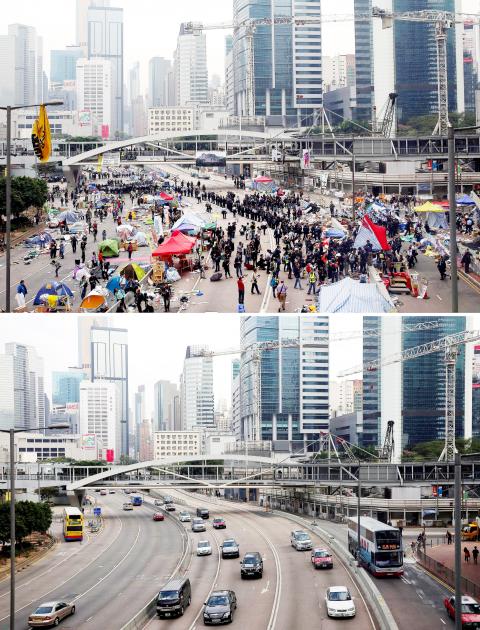Rush-hour traffic yesterday streamed through the heart of Hong Kong for the first time in more than two months after police cleared the territory’s main pro-democracy protest camp with mass arrests, but activists vowed that their struggle would continue.
The east-west artery through the business district had been blocked since September by the sprawling protest site, in a campaign that demonstrators say has changed the territory’s vexed relationship with Beijing and which has polarized public opinion.
Police swept through the Admiralty site on Thursday, clearing the multilane highway and arresting more than 200 protesters.

Photo: AFP
The demonstrators are calling for fully free elections for the territory’s leader in 2017, but Beijing has insisted a loyalist committee vet the candidates, which protesters say would ensure the selection of a pro-China stooge.
Demonstrators say their lengthy occupation has put the democracy movement on the map with Beijing and the local administration, after it brought parts of the territory to a standstill and saw tens of thousands on the streets at its height.
However, it has achieved no political concessions from either Hong Kong’s leaders or Beijing, who both branded the protests “illegal.”
Protest leaders said they would continue to push for reform.
“If we fight a long war we definitely do not have the ... resources the government has,” teenage student leader Joshua Wong said on Thursday.
Instead the movement needed to galvanize the support of young voters, many of whom engaged in politics for the first time during the mass protests.
“If we win the support of the young people regarding democracy ... there is a greater chance to achieve universal suffrage,” Wong said.
“If the problem of political reform is not handled appropriately, I believe [that in] the next phase there will be new resistance actions,” Occupy Central campaign group leader Benny Tai (戴耀廷) said.
Tai handed himself in to police last week in a symbolic bid to get the protests off the street in the wake of violent clashes, only to be turned away without being charged or arrested.
Analysts said the pro-democracy movement — from students to legislators — would have to become more coherent if it is to achieve any political concessions.
“They need to pull together to create a viable coalition of stakeholders,” Chinese University of Hong Kong political analyst Willy Lam said. “They need to act together to lobby and negotiate with the [Hong Kong] administration and Beijing. That would also give the Hong Kong people the impression that they speak with one voice and are much more organized.”
Public support for the movement waned as the weeks of protests wore on and the campaign splintered in different directions.
Some in Admiralty yesterday expressed their support for the police clearance action.
“I think it was correct, because they broke the law,” said one 46-year-old civil servant, who gave his name as George.
However, others expressed disappointment and the need for the movement to continue.
“I am so depressed it’s gone,” 34-year-old Kim Lo said. “I think now we have to sit down and think what we want. We need to spread the message, to help the seed grow. I don’t think we should go back on the streets yet.”

SECURITY: As China is ‘reshaping’ Hong Kong’s population, Taiwan must raise the eligibility threshold for applications from Hong Kongers, Chiu Chui-cheng said When Hong Kong and Macau citizens apply for residency in Taiwan, it would be under a new category that includes a “national security observation period,” Mainland Affairs Council (MAC) Minister Chiu Chui-cheng (邱垂正) said yesterday. President William Lai (賴清德) on March 13 announced 17 strategies to counter China’s aggression toward Taiwan, including incorporating national security considerations into the review process for residency applications from Hong Kong and Macau citizens. The situation in Hong Kong is constantly changing, Chiu said to media yesterday on the sidelines of the Taipei Technology Run hosted by the Taipei Neihu Technology Park Development Association. With

CARROT AND STICK: While unrelenting in its military threats, China attracted nearly 40,000 Taiwanese to over 400 business events last year Nearly 40,000 Taiwanese last year joined industry events in China, such as conferences and trade fairs, supported by the Chinese government, a study showed yesterday, as Beijing ramps up a charm offensive toward Taipei alongside military pressure. China has long taken a carrot-and-stick approach to Taiwan, threatening it with the prospect of military action while reaching out to those it believes are amenable to Beijing’s point of view. Taiwanese security officials are wary of what they see as Beijing’s influence campaigns to sway public opinion after Taipei and Beijing gradually resumed travel links halted by the COVID-19 pandemic, but the scale of

A US Marine Corps regiment equipped with Naval Strike Missiles (NSM) is set to participate in the upcoming Balikatan 25 exercise in the Luzon Strait, marking the system’s first-ever deployment in the Philippines. US and Philippine officials have separately confirmed that the Navy Marine Expeditionary Ship Interdiction System (NMESIS) — the mobile launch platform for the Naval Strike Missile — would take part in the joint exercise. The missiles are being deployed to “a strategic first island chain chokepoint” in the waters between Taiwan proper and the Philippines, US-based Naval News reported. “The Luzon Strait and Bashi Channel represent a critical access

Pope Francis is be laid to rest on Saturday after lying in state for three days in St Peter’s Basilica, where the faithful are expected to flock to pay their respects to history’s first Latin American pontiff. The cardinals met yesterday in the Vatican’s synod hall to chart the next steps before a conclave begins to choose Francis’ successor, as condolences poured in from around the world. According to current norms, the conclave must begin between May 5 and 10. The cardinals set the funeral for Saturday at 10am in St Peter’s Square, to be celebrated by the dean of the College